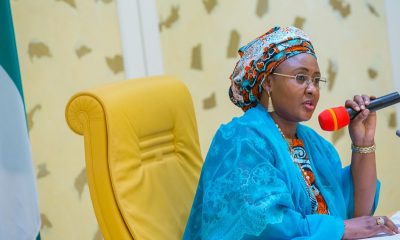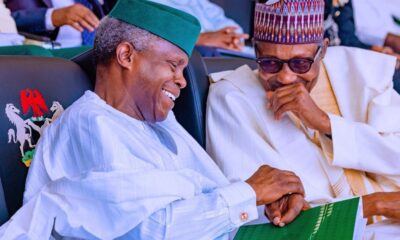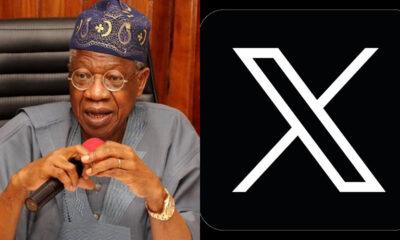News
Buhari’s full speech at 76th United Nations General Assembly
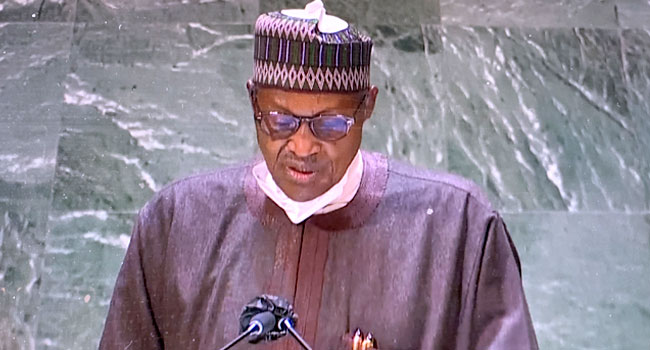
ADDRESS BY HIS EXCELLENCY, MUHAMMADU BUHARI, PRESIDENT OF THE FEDERAL REPUBLIC OF NIGERIA AT THE GENERAL DEBATE OF THE 76TH SESSION OF UNITED NATIONS GENERAL ASSEMBLY IN NEW YORK, USA FRIDAY 24TH SEPTEMBER, 2021
Protocols:
Mr. President,
Let me, on behalf of the government and people of Nigeria, congratulate you on your well-deserved election as President of the 76th Session of the United Nations General Assembly. I would like to assure you of the full support and cooperation of the Nigerian delegation throughout your tenure.
- I would like to commend your predecessor, His Excellency, Mr. Volkan Boskir, for the many remarkable achievements recorded during his tenure, despite the challenges posed by the COVID-19 pandemic.
- Permit me to congratulate the Secretary General, Antonio Guterres, on his re-election and commend his strong commitment to making the UN more alive to its responsibilities.
- I also want to express my gratitude to him for re-appointing Ms. Amina Mohammed, as the Deputy Secretary General to assist him in discharging his heavy responsibilities.
Mr. President,
5. The theme of this year’s General Assembly – “Building resilience through hope – to recover from COVID-19, rebuild sustainably, respond to the needs of the planet, respect the rights of the people, and revitalise the United Nations, sums up our common desire to rescue our planet, recover our economies, and restore hope to all the peoples of the world.
- In this regard, my delegation will continue to support the United Nations, as the indispensable forum for international cooperation and the cornerstone of the multilateral system, rooted in respect for international law, including international human rights law and predicated on a rules-based order.
Mr. President,
- I want to thank the international community for the concerted response to COVID-19. The solidarity and drive to contain the first truly global health emergency of our time is a pointer to the many things we can achieve if we work together.
- On our part, Nigeria has made strenuous efforts to contain the virus and halt its deadly onslaught on our people. Our efforts have been rewarded with moderate success.
- At the outset, we recognised detection and contact tracing to be important tools in combating the virus. In this connection, from a mere four laboratories with testing and detection capacities, we ramped up the facilities to over 140 centres today.
- Similarly, we built isolation centres and emergency hospitals wards in record time all over the country. We carry out genomic sequencing in designated laboratories across the country with a view to detecting variants in circulation.
- In addition, over 40,000 health care workers have recently been trained on Infection, Prevention and Control measures with the support of various partners. Through the Nigerian Centre for Disease Control, we have established 16 infectious disease treatment centres located within our Teaching Hospitals and Federal Medical Centres.
- Nigeria remains grateful for the assistance received from our partners and friends all over the world. Vaccination is the key to our safe emergence from the pandemic. We fully support the COVAX initiative from which we have benefitted. We also thank the United States of America, Turkey, India, China, European Union, and others for the vaccines provided.
- Despite the acknowledgement however, I would like to reiterate my call for a fairer and more equitable distribution of vaccines to all countries so that, together, we can fight and contain the pandemic. The rising wave of newer and more contagious strains, makes this even more urgent. No country can afford the socio-economic implications of prolonged shutdown. It is imperative to underscore that no one is safe until everyone is safe.
Mr President,
- Nigeria remains deeply concerned over the illicit trade, transfer, and circulation of small arms and light weapons. Their excessive accumulation and uncontrolled spread in many regions of the world are having devastating humanitarian and socio-economic consequences, especially on the continent of Africa.
- It is on this note that my delegation calls for the world wide application of the Arms Trade Treaty to codify accountability in conventional arms trade, which is critical to the security of nations. This is in recognition of the need for a broad-based global partnership in the on-going battle against trans-border crimes, including terrorism and piracy.
Mr. President,
16. We must deal not only with the symptoms of conflict but also the immediate causes that fuel conflicts in the first place. These include poor and undemocratic governance, human rights abuses, poverty, ignorance, injustice and inequalities.
- There are no easy solutions to these conditions. They require long term investments and more effective international cooperation. In this connection, my delegation underscores the importance of promoting peaceful, unfettered, and inclusive participation of states in global actions towards conflict prevention. This will facilitate the achievement of the 2030 Agenda for Sustainable Development and the African Union Agenda 2063.
18 In West Africa especially, our democratic gains of the past decades are now being eroded. The recent trend of unconstitutional takeover of power, sometimes in reaction to unilateral changes of constitutions by some leaders, must not be tolerated by the international community. Nigeria fully supports the efforts by ECOWAS to address this growing challenge and appreciates the support of both the African Union and the United Nations. In this regard, I would like to reiterate that as leaders of our individual Member-States we need to adhere to the constitutional provisions of our countries, particularly on term limits. This is one area that generates crisis and political tension in our sub-region.
Mr President,
- Nigeria is fully committed to nuclear non-proliferation and has always supported the view that it should involve all States.
- Disarmament Conventions deserve the support of all states, small, large, nuclear or non-nuclear. Nuclear weapons remain the ultimate agents of mass destruction, and their total elimination should be the final objective of all disarmament processes within the broad spectrum of goals being pursued by the United Nations.
- In this regard, Nigeria would participate actively in the forthcoming Review Conference of the Nuclear Prohibition Treaty and also the First Meeting of States Parties to the landmark Treaty on the Prohibition of Nuclear Weapons, scheduled to take place within the first quarter of 2022.
- Nigeria regards these upcoming events as important steps towards the realisation of a world free of nuclear weapons. We are, therefore, supportive of any diplomatic efforts in this direction. We hope that the upcoming NPT review conference would lead to a successful outcome that would facilitate the denuclearisation of the world. We would do our part to ensure such an outcome.
Mr. President,
- Terrorism continues to dominate security discourse worldwide. In Nigeria, Boko Haram terrorists group, though fragmented by internal strife and weakened by our defence forces, is still active and preying on soft targets. Nigeria will continue to work closely with UN Counter-Terrorism bodies and entities with a view to bringing this scourge to an end.
- Nigeria has spared no effort in addressing the challenges of terrorism posed by the activities of Boko Haram in North-East Nigeria and the Lake Chad region, as well as banditry in the North-West and North-Central Nigeria. The Nigerian Security Forces have recorded considerable success in the fight against terrorism. As a result of the renewed vigour of our military, many terrorist fighters are voluntarily surrendering to our security forces.
- I and three other Nigerian Heads of State served actively as peace keepers and Nigeria continues to support peacekeeping efforts. We know the sacrifice involved, we also know how important peace keeping is for those in vulnerable situations. Nigeria will continue to play its part fully in supporting United Nations peacekeeping operations within Africa and beyond.
Mr. President,
- The impact of climate change is already with us in Nigeria, manifesting in various ways: conflicts trigger; food insecurity, drying up of lakes; loss of livelihood, and youth migration, among others. The trend is the same in many other countries that are threatened by forest fires, rising sea levels, drought and desertification.
- In the circumstances, we intend to build a climate-resilient economy that effectively aligns with the SDGs and that has great potentials to unlocking the full opportunities in different sectors of the economy, while protecting the resources for present and future generations. I know, in several ways, this is also a familiar story in many countries.
- As leaders, we must create inclusive and gender-sensitive policies that address all issues connected to climate action, from mitigation to resilience.
- Nigeria believes that protecting our planet and its biodiversity and climate are important to our collective survival. That is why, we are working on a transition to low carbon economy, consistent with achieving the Paris Climate Agreement and the Sustainable Development Goals.
Mr. President,
- Combating illicit financial flows and ensuring the recovery and return of illicitly acquired assets have the potential to provide resources in the immediate term for financing development in this era of the COVID-19 pandemic and beyond.
- Similarly, corruption across national borders has huge negative impact on the stability, peace, and economic prospects of millions, particularly in developing countries.
- It deprives national Governments of resources needed to provide adequate and meaningful sources of livelihood for their citizens. The latter gives rise to more irregular migration patterns, with unwholesome consequences for inter-state and human relations.
- I, therefore, call on all leaders to demonstrate the much-needed political will by supporting the recommendations for systemic reforms made by the FACTI Panel.
- We support establishing modalities for a global coordination mechanism at the United Nations Economic and Social Council to systematically monitor illicit financial flows and strengthen financial integrity for sustainable development, with the participation of all relevant stakeholders.
Mr. President,
- On the issue of debt, we have seen that developing countries have been faced with unsustainable debt burdens even before the pandemic. The COVID-19 pandemic has increased the risk of new wave of deepening debt, where vital public financial resources are allocated to external debt servicing and repayments at the expense of domestic health and financing for critical developmental needs.
- I must commend the current initiatives by the international financial institutions and the G20 aimed at significantly mitigating the economic situation of the indebted countries and urge for more efforts in this regard.
- Therefore, there is an urgent need to consider expansion and extension of the Debt Service Suspension Initiative to include all Developing, Least Developed Countries and Small Island Developing States facing fiscal and liquidity challenges. In addition, a review of the eligibility criteria for debt suspension, including outright cancellation, is needed for countries facing the most severe challenges.
Mr. President,
- Nigeria reaffirms that international trade is an engine for development and sustained economic growth, as well as the global eradication of poverty.
- My delegation would like to reaffirm the critical role that a universal, rules-based, open, non-discriminatory and equitable multilateral trading system can play in stimulating economic growth and development.
- Fair and equitable trade would eventually eliminate the need for aid. My country and indeed all African countries do not intend to stay indefinitely looking for aid. All we need is a fair and equitable system of international trade.
- We, therefore, call for a reform agenda that will engender better recovery from this crisis, build resilience to future shocks and pursue transformative development strategies that can deliver the 2030 Sustainable Development Goals.
Mr. President,
- The global food system has, in recent times, been impacted by several factors such as population growth, availability and accessibility of arable land and water resources, climate change, and loss of biodiversity.
- Increased competition for resources such as land, water, and energy, has affected food access and supply, particularly in developing countries. Climate change and unpredictable shocks, such as the current global pandemic, further exacerbate vulnerabilities in the global food system, requiring the UN’s urgent attention.
- The Government of Nigeria remains determined to improve the productivity and incomes of small-scale farmers by promoting equal access to land, technology and markets, sustainable food production systems and resilient agricultural practices.
- At the heart of Nigeria’s post-COVID-19 response is the Economic Sustainability Plan, which has a major component, called the Agriculture for Food and Jobs Programme where we seek to leverage suitable technologies to build a resilient food system for the country.
- An integral part of our food systems’ transformation strategy is to create an enabling and supportive environment to implement these policies in a participatory manner.
- Global efforts to mitigate and sustain food systems must involve key stakeholders, including Governments, farmers, investors, multilateral organizations, regional bodies, international financial institutions, private partners and civil society organizations.
Mr. President,
- Nigeria has been steadfast in safeguarding human rights, including the advancement of women, the protection of children, the protection of the rights of people living with disabilities, the treatment of migrants, refugees, returnees and displaced persons as well as, the promotion of fundamental freedoms through all legitimate means. In this regard, my delegation commends the positive example of leaders like Prime Minister Jacinda Arden of New Zealand.
- In this context Nigeria calls for collective global action through a Treaty to end all forms of violence against women and girls of all ages.
- Nigeria remains unwavering in its commitment to ensuring the advancement of human rights within its shores and beyond. This is so even in the context of a vicious decade-long onslaught by terrorists against Nigerians, quite contrary to unwholesome reports by some who hardly verify what they state against us.
- The recent rise in hate related crimes globally underscores the urgent need to continue our engagement about racism, racial discrimination, xenophobia and other related intolerance. It is sad to note that the issue of racism remains alive globally.
- We are beginning to forget our affirmation of the inherent dignity and the equal and inalienable rights of every individual as enshrined in the UN Charter. No society can claim to be free or just if it deprives anyone of these rights.
- Nigeria has long been a principled fighter against racism and all forms of discrimination inspired by its African experience. In the past, racism oiled the machine of slavery and colonialism. Today, racism drives hate crimes and institutional discrimination. In all this, Africans and people of African descent are among the major victims.
- Cognizant of these, I commend Member States for adopting by consensus the resolution on the Establishment of the Permanent Forum of People of African Descent on 2nd August 2021. I am confident that this forum will make significant impact in the quest to end race-related vices and injustices.
Mr. President,
- No reform of the United Nations system is more urgent than that of the Security Council. Stakeholders around the world are asking how such power could be concentrated, with scant representation. The intergovernmental negotiations have taken too long, some 15 years. We must avoid going in cycles. Consensus has been achieved in some of the elements of this reform, especially that of the representation of Africa on the basis of the Elzuwini consensus and the Sirte Declaration. It is unreasonable to expect unanimity in this matter. The issue, indeed, is about justice, not unanimity. Without justice, the legitimacy (even efficacy) of our Organization is called to question. We can and must make substantial, irreversible progress on Security Council reform in the current session.
Mr. President,
- Connected to this, is the question of justice, fairness, and equity in respect of the Palestinian people. The situation in the Middle East is long-standing and gives cause for concern. Nigeria encourages Israel and Palestine to re-engage in dialogue based on relevant UN resolutions and Initiatives. The two-state solution has the support of the international community and is widely acknowledged as the path to lasting peace.
Mr President,
- Our organization is at the peak of the multilateral system. It is also the pre-eminent body for solving our current and emerging challenges, and for developing norms that are protective of us all. We need to re-commit to it, rejuvenate it to better serve us. Nigeria re-affirms its faith in the United Nations and is further resolved to continue to work with all Member-States for peace and security, development and the protection of human rights. In the current moment, hope for these, is dependent on how we assist each other to get COVID-19 out of all countries, regardless of their classification. We can and must do so.
- In this regard, let me close my statement by paying special tribute to a great and humane internationalist, and an exemplary practitioner of multilateral cooperation. I am speaking of Chancellor Angela Merkel of the Federal Republic of Germany. As she exits the stage, we wish her well.
I thank you.
News
Tinubu Rejects Calls to Suspend New Tax Laws, Insists Reforms Will Proceed

Tinubu Rejects Calls to Suspend New Tax Laws, Insists Reforms Will Proceed
President Bola Tinubu has rejected calls to suspend the implementation of Nigeria’s new tax laws, insisting that no substantial issue has been established to justify halting the reform process.
In a statement personally signed on Tuesday, Tinubu affirmed that the tax reform laws, including those that took effect on June 26, 2025, and others scheduled to commence on January 1, 2026, will be implemented as planned.
“No substantial issue has been established that warrants a disruption of the reform process,” Tinubu said. “Absolute trust is built over time through making the right decisions, not through premature, reactive measures.”
The president’s position comes amid growing public debate over alleged discrepancies between the tax acts passed by the National Assembly and versions published in the Official Gazette.
On December 26, the National Assembly ordered a re-gazetting of the tax laws after acknowledging differences between the legislative versions and the published documents. In separate statements, the House of Representatives spokesman, Akin Rotimi, and the Clerk to the National Assembly, Kamoru Ogunlana, assured Nigerians that the matter was being addressed within constitutional and statutory limits.
READ ALSO:
- Two Close Aides of Anthony Joshua Identified as Victims of Fatal Crash
- Court Orders Accelerated Hearing of Suit Challenging 2025 Tax Acts, Declines Injunction
- Sophia Momodu Asks Fans to Stop Calling Her Davido’s Wife
They explained that the review was being conducted in line with the 1999 Constitution, the Acts Authentication Act, and established parliamentary practice, stressing that the exercise was purely administrative and did not suggest any defect in legislative authority.
“This administrative action is intended solely to authenticate and formally reflect legislative decisions,” the statements said, adding that certified true copies would be made available to stakeholders and the public.
However, former Vice President Atiku Abubakar described the situation as “a grave constitutional issue,” arguing that any law published in a form not passed by the National Assembly amounts to a nullity.
“A law that was never passed in the form in which it was published is not law,” Atiku said, warning that any post-passage alteration without legislative approval would constitute a constitutional breach.
Despite the controversy, President Tinubu, who is currently on vacation in Europe, reiterated his administration’s commitment to due process and pledged continued collaboration with the National Assembly to resolve any outstanding issues.
“These reforms are a once-in-a-generation opportunity to build a fair, competitive, and robust fiscal foundation for our country,” Tinubu stated, adding that the new laws are aimed at harmonisation, structural reset, and strengthening the social contract, not increasing tax burdens.
The affected legislations include the Nigeria Tax Act 2025, Nigeria Tax Administration Act 2025, Joint Revenue Board of Nigeria (Establishment) Act 2025, and the Nigeria Revenue Service (Establishment) Act 2025.
Tinubu urged stakeholders to support the implementation phase, which he described as firmly in the delivery stage, assuring Nigerians that the reforms are designed to promote prosperity and shared responsibility.
Tinubu Rejects Calls to Suspend New Tax Laws, Insists Reforms Will Proceed
News
NAF Bombards Lakurawa, Bandit Camps in Zamfara after US airstrike

NAF Bombards Lakurawa, Bandit Camps in Zamfara after US airstrike
In a major escalation of counterterrorism operations across the North-West, the Nigerian Air Force (NAF) has carried out devastating precision airstrikes on notorious bandit enclaves in Zamfara State, coming on the heels of United States missile strikes that crippled Lakurawa terrorist camps in Sokoto.
The Air Component of Operation Fansan Yamma, Sector 2, executed two high-impact air interdiction missions at Turba Hill and the camp of feared bandit leader, Kachalla Dogo Sule, both located in Tsafe Local Government Area of Zamfara State. Several bandits were neutralised, while key operational facilities were destroyed.
Director of Public Relations and Information of the NAF, Air Commodore Ehimen Ejodame, described the strikes as a significant breakthrough in the sustained offensive against armed banditry.
He said the operations were intelligence-driven, relying on credible, multi-source intelligence and persistent surveillance. The first strike targeted Turba Hill, identified as a major bandit hideout. According to Ejodame, aerial reconnaissance revealed intense human activity and a zinc-roofed structure serving as the nerve centre of the enclave.
“Following positive identification, the target was engaged with precision. Post-strike assessments confirmed the complete destruction of the structure and the neutralisation of several bandits,” he said.
The second mission struck Kachalla Dogo Sule’s Camp, a notorious stronghold linked to the manufacture and deployment of improvised explosive devices (IEDs). Intelligence reports had connected the camp to recent deadly IED attacks along the Dan Sadau–Magami axis.
“The precision strike triggered intense fires that destroyed multiple active structures, effectively crippling the group’s IED production and operational capacity,” Ejodame added.
He noted that the airstrikes had significantly degraded bandit networks in Zamfara and reaffirmed the NAF’s commitment, in collaboration with other components of Operation Fansan Yamma, to denying criminal elements safe havens and restoring lasting peace across the North-West.
Army Confirms US Missile Strikes on Sokoto Terror Camps
Meanwhile, the Nigerian Army has confirmed that recent United States airstrikes targeted Lakurawa terrorist camps in Tangaza Local Government Area of Sokoto State, delivering a heavy blow to the group’s operational capability.
A senior Army Headquarters source disclosed that the strikes were conducted in coordination with US Africa Command (AFRICOM) following actionable intelligence on terrorist movements along the Kaurau axis. The missile strikes hit camps in the Bauni Forest near Waria and Alkassim villages on December 25.
Follow-up patrols carried out the next day confirmed extensive destruction of terrorist infrastructure. Troops later recovered missile debris in Kajiji town, Tambuwal LGA, Kebbi State, believed to be components of Tomahawk missiles.
Army engineers identified some of the debris as fuel boosters weighing about 300 kilograms, capable of penetrating soft ground up to two metres. The Army assured residents that investigations and recovery operations were ongoing and urged the public to report any suspicious objects.
Eight Killed as Terrorists Attack Kebbi Communities
Despite the military gains, terror struck Kebbi State as gunmen launched coordinated attacks on Kaiwa, Gelawu and Gebbe villages in Shanga Local Government Area, killing at least eight people and injuring several others.
The Kebbi State Police Command confirmed that seven victims died during the attacks, while another later succumbed to injuries in hospital. One injured person is currently receiving treatment.
Police spokesperson, CSP Bashir Usman, said security forces had intensified patrols and surveillance across the affected areas to prevent further attacks, though details of ongoing operations could not be disclosed.
Residents described the assaults as unprecedented and devastating, forcing many villagers to flee their homes in fear.
Troops Kill 80 Terrorists, Rescue 34 Victims Nationwide
In a broader update, the Nigerian Army announced that troops killed over 80 terrorists, rescued 34 kidnapped civilians and arrested several criminal suspects in coordinated operations across multiple states between December 25 and 29.
The operations spanned Borno, Adamawa, Sokoto, Katsina, Niger, Zamfara, Plateau, Delta, Cross River and the Federal Capital Territory.
In Borno State, air and ground offensives neutralised 57 terrorists and disrupted ISWAP/JAS networks, while operations in Niger and Katsina repelled coordinated attacks and recovered stolen livestock.
Troops also rescued kidnapped civilians in Kebbi and Plateau states, arrested illegal miners in the FCT, apprehended armed robbery suspects, and dismantled oil bunkering and piracy syndicates in Delta and Cross River states.
The Army said the successes underscore its resolve to sustain intelligence-driven operations, protect lives and property, and dismantle terrorist and criminal networks across the country.
News
Sokoto Operation: FG Reassures Investors, Says Nigeria’s Economy Remain Stable

Sokoto Operation: FG Reassures Investors, Says Nigeria’s Economy Remain Stable
The Federal Government has reassured investors, financial analysts, and international development partners that Nigeria remains peaceful, stable, and economically resilient despite concerns following a joint security operation in Sokoto carried out on Christmas Day.
The Minister of Finance and Coordinating Minister of the Economy, Wale Edun, gave the assurance in a statement issued on Sunday in Abuja, explaining that the operation—conducted in collaboration with the United States—was a targeted, intelligence-led action aimed solely at terrorist elements threatening national security and economic activities.
“What Nigeria is decisively confronting—alongside trusted international partners—is terrorism,” Edun said, stressing that the context of the operation was essential to understanding its broader economic implications.
He described the Sokoto operation as “precise, intelligence-led, and focused exclusively on terrorist elements that threaten innocent lives, national stability, and economic activity,” adding that the action was designed to strengthen security rather than unsettle financial markets or undermine investor confidence.
“Far from destabilising markets or weakening confidence, such actions strengthen the foundations of peace, protect productive communities, and reinforce the conditions required for sustainable economic growth. Security and economic stability are inseparable; every effort to safeguard Nigerians is, by definition, pro-growth and pro-investment,” the minister said.
READ ALSO:
- Ibadan Explosion: Fayose Releases Documents, Claims Makinde Got ₦50bn from FG
- Italy Arrests Nine Over €7M Hamas Funding Network, Seizes €8M in Assets
- Kennedy Center Sues Musician for $1M Over Trump Name Cancellation
Edun noted that under the leadership of President Bola Ahmed Tinubu, Nigeria has recorded measurable progress in security improvements and economic reforms, reflected in key macroeconomic indicators.
According to him, Nigeria’s GDP grew by 3.98 per cent in Q3 2025, following a strong 4.23 per cent growth in Q2, with expectations of an even stronger performance in Q4 2025. He added that inflation has slowed for the seventh consecutive period and now stands below 15 per cent, attributing the improvement to coordinated fiscal and monetary policies.
The minister said Nigeria’s financial markets remain stable, with both domestic and international debt markets functioning efficiently under prudent fiscal management. He recalled that the country recently secured credit rating upgrades from Moody’s, Fitch, and Standard & Poor’s, describing them as independent validation of the government’s reform agenda.
“We have maintained fiscal discipline, prioritised efficiency, and protected macroeconomic stability, demonstrating resilience in the face of external shocks,” Edun said.
Referring to President Tinubu’s recent national address, Edun stated that the administration’s focus for 2026 is to consolidate gains made in 2025, strengthen economic resilience, and sustain momentum toward inclusive and durable growth.
Assuring local and foreign investors ahead of market reopening on Monday, December 29, 2025, Edun said confidence in Nigeria’s economic direction remains justified.
“As markets reopen, investors can be confident that Nigeria remains reform-driven, stable, and focused on growth. The fundamentals are strengthening, the policy direction is clear, and this administration’s resolve to protect lives and secure prosperity is unwavering,” he said.
He concluded by reaffirming the country’s investment outlook: “Nigeria remains open for business, anchored in peace, and firmly focused on the future.”
Sokoto Operation: FG Reassures Investors, Says Nigeria’s Economy Remain Stable
-

 Entertainment3 days ago
Entertainment3 days agoBreaking: Popular Nigerian Actress Allwell Ademola Dies at 43
-

 metro1 day ago
metro1 day agoNiger Delta Crackdown: Army Seizes ₦150m Stolen Oil, Arrests 19 Suspects
-

 metro2 days ago
metro2 days agoPlateau Kidnappers Demand ₦1.5m Each as 28 Muslim Travellers Remain in Captivity
-
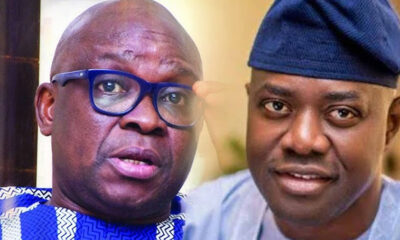
 metro2 days ago
metro2 days agoIbadan Explosion: Fayose Releases Documents, Claims Makinde Got ₦50bn from FG
-

 Sports1 day ago
Sports1 day agoCristiano Ronaldo Wins Best Middle East Player at 2025 Globe Soccer Awards in Dubai
-

 Opinion3 days ago
Opinion3 days agoHow a Misleading Channels TV Headline Reignited Nigeria’s Religious Tensions
-

 Sports1 day ago
Sports1 day agoAnthony Joshua injured as two die in fatal Lagos-Ibadan Expressway crash (plus photos)
-

 metro3 days ago
metro3 days agoNigerian Army Kills 438 Boko Haram, ISWAP Terrorists in Seven Months



